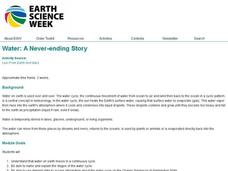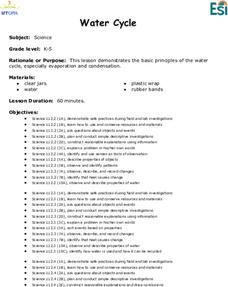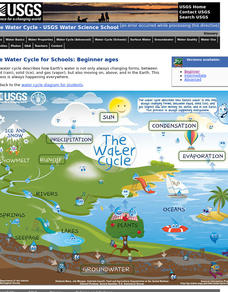Curated OER
What Do Heating and Cooling Do?
In this changes of matter worksheet, students write in what happens when water is heated and when water gets very cold. This worksheet is a graphic organizer.
Curated OER
Water: A Neverending Story
Students investigate the water cycle. In this water cycle science lesson, students participate in a series of activities that demonstrate evaporation, precipitation, and condensation. Students describe their observations using water...
Curated OER
Water Cycle
Students perform experiments with water to observe the principles of evaporation and condensation. They make models of the water cycle and discuss the processes that occurred in their experiments with their jars of water.
Curated OER
Water Magic
Young scholars conduct experiments with ice, water and steam to observe the water cycle. They discuss substances that water accumulates from the Earth as it moves through its cycle.
Curated OER
Gases, Liquids And Solids
Students investigate how gases are different from solids and liquids and that they can evaporate and condense. They observe water boiling in a teapot and discuss what happens when the steam touches a cold window, complete an online Heat...
US Geological Survey
The Water Cycle for Schools: Beginner Ages
Explore a day in the life of a water droplet. An interactive infographic helps scholars learn how water cycles work from precipitation all the way around to condensation. Learners hover over each step of the cycle to read more as they...
Curated OER
The Magic School Bus Wet All Over Clean-up!
Students investigate the water cycle using activities from The Magic School Bus series. They determine what happens when water is heated and cooled by observing two different experimental set-ups.
Curated OER
Water Filtration
Students design a filtration system using three filtration materials. In this water filtration lesson, students conduct an experiment with their filtration systems. Students present their systems to the class. Group results are...
Curated OER
The Magic School Bus Wet All Over
Students observe the water cycle and experiment with cleaning water. For this hands-on hydrology lesson based on a Magic School Bus book, students conduct two experiments to see the how water moves through the water cycle and then they...
Curated OER
Three Clouds Activity
Students understand how clouds are formed. In this cloud lesson, students participate in three experiments to make clouds. Students complete activity sheets for each experiment.
Curated OER
If I Were A Raindrop!
Students review the water cycle. In this water cycle lesson, students review the different stages of the water cycle. Students use the computer program Kid Pix Weather to help demonstrate understanding.
Curated OER
Water Cycle and Ecosystems
Students explore the water cycle. In this investigative lesson, students examine the water cycle process. They will record their observations and discuss marine and freshwater ecosystems.
Curated OER
Three Clouds Activity
Students explore how clouds are produced through three different age-appropriate hands-on experiments.
Curated OER
Cavern Life
Students describe elements and conditions that effect cavern life. They explain the three cavern zones and the differences of each zone. They perform various activities based on grade level.
BBC
Bb Ci Schools: Revisewise Science: Solids, Liquids, Gases
This site contains an interactive activity in which students can learn about the three states of matter. There is also a factsheet that lists numerous properties of liquids, solids, and gases. The factsheet also uses water as an example...
















